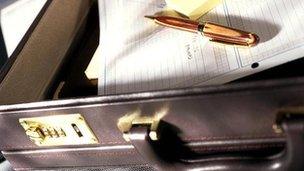Tax avoidance: Individuals' common schemes
- Published

Many of the most common tax avoidance schemes have been around for a long time
Tax avoidance is back in the news again following the appearance of the "Big Four" accountancy firms in front of a committee of MPs.
Year after year, some wealthy individuals have used legitimate reliefs to pay little or no tax, according to the Treasury. Other schemes have been seen as more contrived.
The way in which these high-income individuals have used the system has led to an argument about morality, but also what can be done to halt the avoidance.
Accountants and commentators say this is nothing new, as many of these schemes have been around for years.
Remember, tax avoidance - unlike tax evasion - is perfectly legal, so it is up to the government to change the rules to make these people pay more in tax.
So, what are the most common ways that individuals look to mitigate their tax bill?
The BBC News website asked two experts to pick out some of the most common avoidance schemes: Ronnie Ludwig of Saffery Champness Accountants and John Whiting of the Chartered Institute of Taxation, who also advises the government on tax simplification.
Tax reliefs
Wealthy individuals have a lot of disposable income - money that is not needed to heat the house, feed the children, or pay the council tax bill.
This income can be invested in things that lead to a reduction in the amount of tax they have to pay.
For example, this income can be pumped into an individual's pension scheme, up to a certain limit, or into schemes that are aimed at allowing businesses to thrive.
The latter - known as Enterprise Investment Schemes - are designed to encourage wealthy people to invest in new businesses that appear to have good ideas, but could be risky investments.
Banks may not be willing to take the risk these days, but wealthy people are encouraged to do so because they receive tax relief on the chunk of their own income that they put in and also pay little or no tax on any return they get out if the business is successful.
Some of these schemes already have a limit on how much income people can invest and get tax relief on.

Many of the most common tax avoidance schemes have been around for a long time
Others do not, such as giving a chunk of their income to charity, or possibly donating a chunk of their companies' shares.
Some people may choose to give some of their income to charity, rather than the state. As with some reliefs they may not benefit directly as individuals, but it may mean the government does not gain as much in tax as it might expect, as the charities would benefit instead.
This month a cap of 25% of incomes (or £50,000, whichever is the greater) was introduced for income tax relief, available on a range of methods that do not already have caps.
Another well-known ploy, available to anyone, is to insure their lives, and write this policy into a trust for their children, so the money passes straight to them without paying inheritance tax. However, for somebody approaching later life, the premiums on such a policy are likely to be expensive.
Employing a husband or wife
Again, this is a perfectly legitimate thing to do, for those who have their own business.
Many small businesses might survive only because the owner's husband or wife is prepared to do a lot of work behind the scenes for relatively little pay.
However, some businessmen and women have employed their husbands or wives, who paid little or no tax previously. They might do very little work, but are still paid a salary.
This means that the couple divides its income tax bill, rather than one of them - who might be the boss of the company - receiving all of the income and so paying a larger amount in tax.
The benefit from this arrangement arises because most people get a tax-free allowance to set against the first chunk of their income.
This applies in full only to individuals with a taxable income of less than £100,000.
Above that level, the once-universal personal allowance is gradually withdrawn.
If only one of the couple took all the income, he or she might also be pushed into a higher tax bracket.
The couple may also pay less tax by sharing ownership of the company and paying themselves a dividend, rather than salary - something that governments have also tried to crack down on.
What is being done?
Chancellor George Osborne wants to strengthen existing rules against this and similar schemes by introducing a General Anti-Abuse Rule (GAAR).
This aims to act as blanket legislation to allow the taxman to differentiate between what counts as responsible tax planning and what is abusive tax avoidance. An advisory group, external on the issue has now been set up, with the government intending to bring in the rule soon.
The test should be clearer - did Parliament intend for this tax not to be paid when it set out tax laws?
That does not mean that this will not be challenged by either side, and accountants say that these appeals could still be lengthy and expensive.
Some say the line between avoidance and legitimate tax planning will still be blurred. But others argue that the general rule should create a culture in which people will think twice about signing up to an avoidance scheme, knowing that they may be more likely to pay back the tax and pay a penalty.